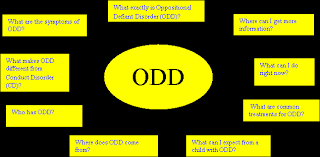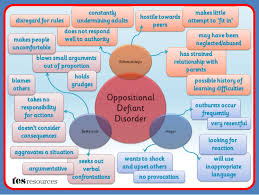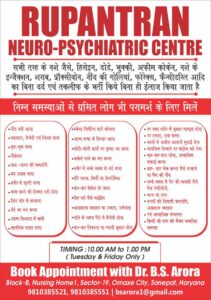Oppositional defiant disorder (ODD) is a disorder observed in children and teenagers who often have a persistent behaviour to oppose their parents or any higher authority.

They have a pattern of argumentative and defiant behaviour, angry and irritable moods and vindictiveness. It is important for the parents to observe and understand their behaviour so that their ODD is dealt with care. Such patients require child development experts and mental health professionals to treat the mental disease. The treatment mainly includes behavioural treatment that involves managing conflicting behaviour of children towards their parents, teaching parents about how to deal with the behaviours without getting disturbed and affected and without letting the child-parent relationship become sour. Although there is no apparent cause for the disease to occur in a child but still genetics and environmental factors can somewhat be held responsible for the disorder. Environmental factors like harsh discipline, lack of supervision and abuse or excessive neglect for a long time or for many years and other family issues lead to this disorder. Treatment for oppositional defiant disorder includes parent training, parent-child interaction therapy (PCIT), individual and family therapy, cognitive problem-solving training and social skills training. Parents are also given training to manage their children’s behaviour.
How is the Oppositional Defiant Disorder treatment done?
It is important that children with ODD who have difficulties in controlling their rude, aggressive and annoying behaviour towards their parents, teachers or any higher authority be treated appropriately during their young ages only. They also face rejection from their peers because of the poor social abilities. The behaviours if remain unchecked can grow and get developed into a more serious disorder called conduct disorder. So, in order to correct your child’s behaviour early in life and stop him/her to develop any other serious disorder, it is important that you get their treatment started with a good therapist. Normally medication is not required for the treatment of ODD unless they are diagnosed with some other mental disorder like depression, ADHD or anxiety. Treating ODD involves parent treating, parent-child interaction therapy, individual and family therapy, cognitive problem-solving training and social skills training. In parent training your experienced mental health therapist will help you learn consistent and positive parenting skills. In this training, sometimes even children will be made to participate so that parents and children together learn how to deal with issues, the wrong behaviour and stress and anxiety. The parents are trained to manage their child’s behaviour by acknowledging and praising their good deeds and their positive attributes and also trained to give apt instructions very appropriately so that it does not irk the child. In parent-child interaction the therapist helps both the parent and the child to interact and deal with issues in the training sessions. The therapist guides the parent from behind a one-way mirror using earphones on how to effectively parent the child’s behaviours, thereby improving the child-parent relationship. It is also important that the therapist have direct conversation with the child so that he/she can express their feelings and learn to manage their anger in a healthy way. Children are also helped to understand the problems, get involved in problem solving and learn social skills to act and behave positively to peers.
Who is eligible for the treatment? (When is the treatment done?)
It is important to identify that problems that the child is facing, their rude behaviour, anger, poor social skills, stress and anxiety are due to ODD. Once determined with the help of an experienced mental health professional, the child will be eligible for the treatment.

Who is not eligible for the treatment?
Whether a child with ODD requires treatment from a professional mental health therapist depends upon the parents. It is important to understand whether the condition is permanent or is coexisting with many other negative symptoms. In case a child does not show the symptoms for very long time and the behaviours are controlled and managed effectively by their parents, such a child will not be eligible for treatment.
Are there any side effects?
No, there is no side effect for the treatment because the treatment usually does not require any medication unless the child is also suffering from anxiety and depression. The treatment mainly involves therapy that requires talking problems out, behavioural training and training for developing social skills and communication.
What are the post-treatment guidelines?
Since, the treatment usually does not involve any medication or surgery, and is only a behavioural training there is no such specific post-treatment guidelines. The training is an on-going process and the positive changes in the behaviour are evident after about 6-12 months.
How long does it take to recover?
The therapy involves behavioural training and no medication. Hence, it takes a long time to treat ODD of a child with talk therapy, training to communicate effectively, develop better social skills and understand problems and work appropriately without reacting negatively to any situation. It may take about 6 to 12 months to see positive changes in the child.
Are the results of the treatment permanent?
Yes, the results are permanent once the root causes of the problems have been identified. Once both parent and child get training about how to deal with the situations and behaviours the same issues usually do not arise again.
What are the alternatives to the treatment?
Parents should develop certain good and positive habits right from the beginning when the child is growing up. Right from the time he/she starts perceiving things and behave as he/she likes parents must watch their actions and behaviours and train them accordingly. Child’s defiant behaviour can be managed by following some of the listed ways:
(1) recognising and praising the good deeds of your child,
(2) setting limits for both yourself and your children and not over reacting in any situation,
(3) setting up routine,
(4) working together,
(5) spending quality time together,
(6) assigning household chores for every member in the family and
(7) preparing the child to take up challenges sportively and positively.
If you need help form my team ,feel free to contact my team .
Mobile-9810385521
Email [email protected]
www.psycareco.in
